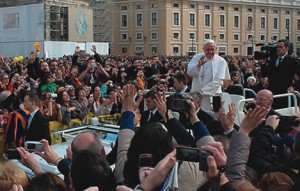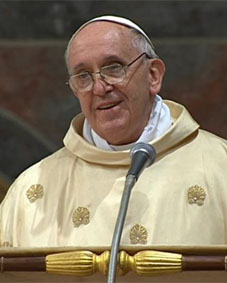On the Role of Priests and the Witness of Women
the role of priests
A good priest can be recognized by the way his people are anointed. This is a clear test. When our people are anointed with the oil of gladness, it is obvious: for example, when they leave Mass looking as if they have heard good news. Our people like to hear the Gospel preached with “unction”, they like it when the Gospel we preach touches their daily lives, when it runs down like the oil of Aaron to the edges of reality, when it brings light to moments of extreme darkness, to the “outskirts” where people of faith are most exposed to the onslaught of those who want to tear down their faith. People thank us because they feel that we have prayed over the realities of their everyday lives, their troubles, their joys, their burdens and their hopes. And when they feel that the fragrance of the Anointed One, of Christ, has come to them through us, they feel encouraged to entrust to us everything they want to bring before the Lord: “Pray for me, Father, because I have this problem”, “Bless me”, “Pray for me” – these words are the sign that the anointing has flowed down to the edges of the robe, for it has turned into prayer.
The prayers of the people of God. When we have this relationship with God and with his people, and grace passes through us, then we are priests, mediators between God and men. What I want to emphasize is that we need constantly to stir up God’s grace and perceive in every request, even those requests that are inconvenient and at times purely material or downright banal – but only apparently so – the desire of our people to be anointed with fragrant oil, since they know that we have it. To perceive and to sense, even as the Lord sensed the hope-filled anguish of the woman suffering from haemorrhages when she touched the hem of his garment. At that moment, Jesus, surrounded by people on every side, embodies all the beauty of Aaron vested in priestly raiment, with the oil running down upon his robes. It is a hidden beauty, one which shines forth only for those faith-filled eyes of the woman troubled with an issue of blood. But not even the disciples – future priests – see or understand: on the “existential outskirts”, they see only what is on the surface: the crowd pressing in on Jesus from all sides (cf. Lk 8:42). The Lord, on the other hand, feels the power of the divine anointing which runs down to the edge of his cloak.
We need to “go out”, then, in order to experience our own anointing, its power and its redemptive efficacy: to the “outskirts” where there is suffering, bloodshed, blindness that longs for sight, and prisoners in thrall to many evil masters. It is not in soul-searching or constant introspection that we encounter the Lord: self-help courses can be useful in life, but to live by going from one course to another, from one method to another, leads us to become pelagians and to minimize the power of grace, which comes alive and flourishes to the extent that we, in faith, go out and give ourselves and the Gospel to others, giving what little ointment we have to those who have nothing, nothing at all.
General Audience 3 April
on the witness of women
 ... However, the Pope preferred to emphasize the witness that takes the form of a story, recalling above all that, in these types of testimonials, women are the first witnesses. They are the ones who, at dawn, go to the tomb to anoint Jesus’ body and find the first sign: the empty tomb. They then encounter the divine messenger who tells them: Jesus of Nazareth, the Crucified One, is not here. He is risen.
... However, the Pope preferred to emphasize the witness that takes the form of a story, recalling above all that, in these types of testimonials, women are the first witnesses. They are the ones who, at dawn, go to the tomb to anoint Jesus’ body and find the first sign: the empty tomb. They then encounter the divine messenger who tells them: Jesus of Nazareth, the Crucified One, is not here. He is risen.
“The women,” he attested, “are compelled by love and know how to welcome this announcement with faith. They believe and immediately they share [the announcement]. They don’t keep it for themselves but convey it. They can’t contain the joy of knowing that Jesus is alive, the hope that fills their hearts.
This should also happen in our lives. We should feel the joy of being Christians! We believe in the Risen One who has conquered evil and death! We must have the courage to ‘go out’ to bring this joy and this light to all the areas of our lives. Christ’s Resurrection is our greatest certainty. It is our most precious treasure! How can we not share this treasure, this certainty, with others? It is not just for us: it is to be proclaimed; to be given to others; to be shared with others. This is precisely our witness.”
Francis noted another element of the profession of faith in the New Testament: that only men are recorded as witnesses of the Resurrection, the Apostles but no women. “This is because,” he explained, “according to Jewish law of the time, women and children couldn’t give reliable, credible witness. In the Gospels, however, women have a primary, fundamental role.

 Entries(RSS)
Entries(RSS)